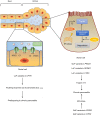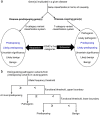Expanding ACMG variant classification guidelines into a general framework
- PMID: 35974416
- PMCID: PMC9380380
- DOI: 10.1186/s40246-022-00407-x
Expanding ACMG variant classification guidelines into a general framework
Abstract
Background: The American College of Medical Genetics and Genomics (ACMG)-recommended five variant classification categories (pathogenic, likely pathogenic, uncertain significance, likely benign, and benign) have been widely used in medical genetics. However, these guidelines are fundamentally constrained in practice owing to their focus upon Mendelian disease genes and their dichotomous classification of variants as being either causal or not. Herein, we attempt to expand the ACMG guidelines into a general variant classification framework that takes into account not only the continuum of clinical phenotypes, but also the continuum of the variants' genetic effects, and the different pathological roles of the implicated genes.
Main body: As a disease model, we employed chronic pancreatitis (CP), which manifests clinically as a spectrum from monogenic to multifactorial. Bearing in mind that any general conceptual proposal should be based upon sound data, we focused our analysis on the four most extensively studied CP genes, PRSS1, CFTR, SPINK1 and CTRC. Based upon several cross-gene and cross-variant comparisons, we first assigned the different genes to two distinct categories in terms of disease causation: CP-causing (PRSS1 and SPINK1) and CP-predisposing (CFTR and CTRC). We then employed two new classificatory categories, "predisposing" and "likely predisposing", to replace ACMG's "pathogenic" and "likely pathogenic" categories in the context of CP-predisposing genes, thereby classifying all pathologically relevant variants in these genes as "predisposing". In the case of CP-causing genes, the two new classificatory categories served to extend the five ACMG categories whilst two thresholds (allele frequency and functional) were introduced to discriminate "pathogenic" from "predisposing" variants.
Conclusion: Employing CP as a disease model, we expand ACMG guidelines into a five-category classification system (predisposing, likely predisposing, uncertain significance, likely benign, and benign) and a seven-category classification system (pathogenic, likely pathogenic, predisposing, likely predisposing, uncertain significance, likely benign, and benign) in the context of disease-predisposing and disease-causing genes, respectively. Taken together, the two systems constitute a general variant classification framework that, in principle, should span the entire spectrum of variants in any disease-related gene. The maximal compliance of our five-category and seven-category classification systems with the ACMG guidelines ought to facilitate their practical application.
Keywords: ACMG guidelines; Allele frequency threshold; Allelic heterogeneity; Disease prevalence; Exome sequencing; Genetic heterogeneity; Incomplete penetrance; Multifactorial/complex disease; Pathogenicity; Variant interpretation.
© 2022. The Author(s).
Conflict of interest statement
The authors have no conflicts of interest to declare that are relevant to the content of this article.
Figures



References
-
- Richards S, Aziz N, Bale S, Bick D, Das S, Gastier-Foster J, et al. Standards and guidelines for the interpretation of sequence variants: a joint consensus recommendation of the American college of medical genetics and genomics and the association for molecular pathology. Genet Med. 2015;17(5):405–424. doi: 10.1038/gim.2015.30. - DOI - PMC - PubMed
-
- Kelly MA, Caleshu C, Morales A, Buchan J, Wolf Z, Harrison SM, et al. Adaptation and validation of the ACMG/AMP variant classification framework for MYH7-associated inherited cardiomyopathies: recommendations by ClinGen’s inherited cardiomyopathy expert panel. Genet Med. 2018;20(3):351–359. doi: 10.1038/gim.2017.218. - DOI - PMC - PubMed
Publication types
MeSH terms
Substances
LinkOut - more resources
Full Text Sources
Research Materials
Miscellaneous

